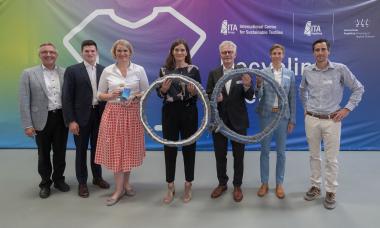Redefining textile waste sorting
To meet future demands on the amount of textile waste which needs to be collected and sorted, as well as the demand on recycling feedstock, it is necessary to match the demand and need for sorting of waste in Europe and create cost efficiency sorting capacities with larger scale and automation are necessary.
In an online session “Redefining Textile Waste Sorting: Impulses and findings for the future of next-gen sorting facilities” Texaid and partners talk about the current state of development and the challenges for the future. Anna Pehrsson (Texaid), Gesine Köppe (ITA Augsburg GmbH) and partners present the results of a Technology Assessment conducted within The Transform Textile Waste into Feedstock Project (initiated by TEXAID within the ReHubs initiative) to assess the best available sorting techniques and process.
Details:
December 4th 2023
12:30-13:30pm
Online
For registration follow the link.
Texaid










